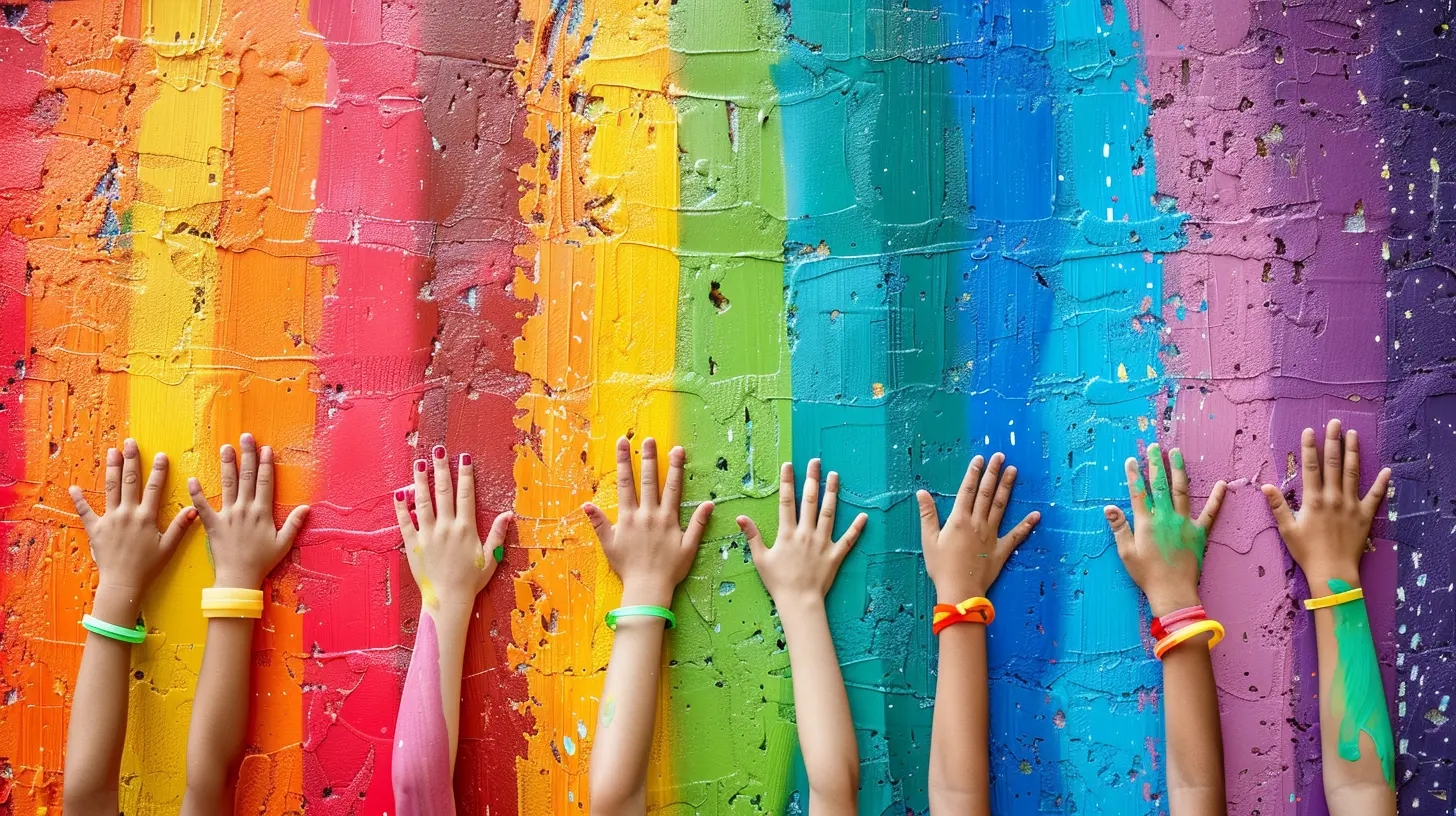Celebrating Neurodiversity: How to Foster Pride in Your Child
26 July 2025
Raising a child who thinks, feels, or communicates differently can be a beautiful, eye-opening journey. Neurodiversity—the idea that neurological differences like autism, ADHD, dyslexia, and more are simply variations of the human brain—challenges us to reframe what we think of as “normal.” It’s not about fixing your child; it's about appreciating and celebrating who they are.
In a world that still leans heavily on standard ways of thinking and behaving, it can be tough for neurodivergent kids to feel accepted, let alone proud. But here’s the good news: you, as a parent, play a massive role in shaping your child’s self-image.
So how do we go beyond just acceptance and actually help our kids feel proud of their unique minds? That’s exactly what we’re diving into.
What Is Neurodiversity, Really?
Let’s start with the basics. Neurodiversity is a term that recognizes that neurological differences are just that—differences. Not disorders. Not deficits. Just another way the brain works.Think of it this way: some brains are wired for structure and schedules, others are built for imagination and spontaneity. Some kids love math, others hum tunes until midnight. One isn’t better than the other—they’re just different operating systems.
The concept encourages us to stop labeling kids as “broken” or “behind” and instead see their strengths, quirks, and potential.
Why Fostering Pride Matters
Self-esteem isn’t a luxury; it’s a necessity. And for neurodivergent kids, it doesn’t always come easy. They often hear what they can’t do. They’re told to try harder, sit still, or change how they interact with the world.Over time, those messages sink in—and not in a good way.
But when you nurture pride in their identity, something magical happens. Your child begins to believe in themselves. They stop trying to fit into boxes that were never made for them. They start carving their own path.
And that, my friend, is how confidence is born.
1. Start with Self-Awareness (And Keep It Honest)
The journey to self-pride starts with self-awareness. Your child deserves to understand how their brain works—and that it’s okay to be different.Be open about their diagnosis (if they have one), but keep it age-appropriate. Use real-life comparisons to make it relatable. For example, “Your brain works like a super-fast race car. Sometimes it zooms past things others notice, and that’s okay. It also means you see the world in ways others don’t.”
Avoid negative language. Instead of "disorder" or “problem,” talk about "differences" or "brain styles." This helps your child see their neurodivergence as something to be embraced, not hidden.
Pro Tip: Read books or watch videos about neurodiversity with your child. Representation matters, and seeing characters like them can be a game-changer.
2. Celebrate the Wins (Big or Small)
You know what's better than a gold star? Genuine celebration. Neurodivergent kids often get overlooked for the little victories—like remembering to bring their water bottle home or making it through a noisy school day.Every win counts. Seriously. Celebrate the small stuff, not just the big milestones.
Say things like:
- “You handled that tough moment so well!”
- “It’s awesome how your brain helped you come up with that creative solution.”
- “You’re really good at figuring things out your way.”
Make sure they know their strengths aren’t just “special interests”—they’re superpowers.
3. Create a Safe, Judgment-Free Space
Let’s be real: the outside world can be harsh. That’s why home should be a soft landing. A place where your child can be completely themselves without fear of criticism.Encourage them to stim, pace, repeat, draw, flap—whatever helps them feel calm and happy. Let them talk endlessly about their favorite topic. Give them sensory-friendly spaces to relax. Let them rest when the world gets overwhelming.
This tells them they are not “too much” or “wrong” just for being who they are.
And don’t forget to advocate for them when others don’t understand. Whether it's at school, social gatherings, or even family events, speak up for their needs and model how to do the same.
4. Talk About Famous Neurodivergent Role Models
If your child tends to feel "less than," shift the perspective by showing them successful neurodivergent individuals who changed the world.People like:
- Temple Grandin (autistic scientist and speaker)
- Simone Biles (ADHD and Olympic gymnast)
- Dan Aykroyd (autistic comedian and actor)
- Greta Thunberg (autistic climate activist)
Let your child see that being different doesn’t mean being less—it means having a unique set of tools that can make a big impact.
5. Practice Affirming Language Daily
Words matter. The more your child hears affirming, positive language tied to their neurodiversity, the more they’ll internalize those messages.Try saying things like:
- “You’re not broken, you’re brilliant.”
- “Your brain is wired in a way that helps you see things others miss.”
- “Being neurodivergent is a strength, not a weakness.”
Make these affirmations part of your daily routine, kind of like brushing teeth—but for the soul.
Even better? Encourage your child to develop their own affirmations and write them on sticky notes or posters in their room.
6. Let Them Take the Lead
One of the best things you can do is to follow your child’s lead. What are they passionate about? What excites them? What helps them feel most like themselves?Support those interests—no matter how niche or “different” they seem. If your child is into insects, anime, or trains from the 1920s, dive all in. Buy the books, visit the museums, attend the conventions.
This shows them that their passions are valid, valuable, and worth investing in.
Let them explore who they are without fear of judgment. Pride blooms in freedom.
7. Connect with the Neurodivergent Community
Finding people who “get it” is a game-changer. Whether it’s an online group, a local support club, or a neurodivergent mentor, your child can benefit from knowing they’re not alone.Seeing others who share their experiences—and are thriving—helps create a powerful sense of belonging.
And don’t forget mom and dad: connect with other parents. You’ll feel less isolated and pick up some seriously helpful tips along the way.
8. Tackle Shame with Open Conversations
Many neurodivergent kids face shame—because they’ve been punished for reacting “wrong,” misunderstood, or made to feel like they’re too much.That emotional wound can stick around if we don’t address it.
So let’s talk about it. Ask your child how they feel about their differences. What’s hard? What makes them proud?
Normalize emotions. Remind them that ALL feelings are valid. And when they mess up (they will—we all do), avoid shame-based talk. Focus on guiding, not scolding.
The goal? Help them understand that mistakes don’t define their worth.
9. Educate Others (Including Yourself)
Fostering pride in your child also means being a fierce advocate. That starts with education—both for you and the people around your child.Read books, listen to neurodivergent voices, attend webinars. Stay curious and open-minded.
Then, gently educate your family, friends, teachers, and caregivers. Share helpful phrases, explain triggers, and push for accommodations when needed.
When your child sees you standing up for them, they’ll learn to do the same. And that kind of confidence? It’s contagious.
10. Keep the Conversation Going
Fostering pride isn’t a one-and-done deal. It’s a lifelong conversation—a constantly shifting, evolving dance between acceptance and celebration.Check in with your child regularly. Ask how they’re feeling about school, friendships, and their identity. Listen without interrupting. Validate their experiences.
And above all? Keep showing up. Day after day, moment after moment.
Because when your child knows they are deeply, unconditionally loved for who they are, pride becomes a natural part of their identity.
Final Thoughts
Neurodiversity isn’t something to “overcome.” It’s something to honor. Every child deserves to feel proud of who they are—especially when their brain doesn’t work the way the world expects it to.By showing your child that their differences are strengths, by celebrating every part of their identity, you help them walk taller and dream bigger.
The world might not always get them—but you do.
And that? That makes all the difference.
all images in this post were generated using AI tools
Category:
Special NeedsAuthor:

Noah Sawyer
Discussion
rate this article
2 comments
Lola Wilkerson
This article beautifully highlights the importance of embracing neurodiversity. Fostering pride in our children's unique strengths is crucial for their self-esteem. Let's celebrate their differences and create a supportive environment where they can thrive confidently!
January 24, 2026 at 4:27 AM
Annabelle Collins
Celebrating neurodiversity is essential for fostering pride in your child. Embrace their unique strengths and help them understand their brain's differences as gifts. Encourage open conversations about neurodiversity, celebrate milestones, and create a supportive environment where they feel valued and empowered to be their authentic selves.
August 4, 2025 at 4:46 AM

Noah Sawyer
Thank you for your thoughtful comment! Embracing neurodiversity is indeed key to helping children celebrate their uniqueness and thrive. Your insights on fostering open conversations and support are invaluable.


